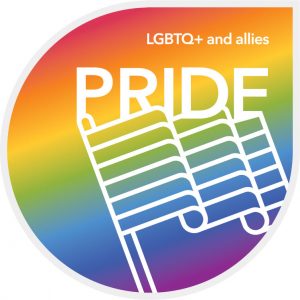 Every June I try to write a blog post in honor of PRIDE month and in celebration of my wonderful LGBTQ+ colleagues, friends, and family members. This is for all the other parents and allies out there. It is about showing up. It is about aligning your words with your actions. It is about the small, almost effortless, things you can do every day to make this world better and safer for LGBTQ+ people in our community.
Every June I try to write a blog post in honor of PRIDE month and in celebration of my wonderful LGBTQ+ colleagues, friends, and family members. This is for all the other parents and allies out there. It is about showing up. It is about aligning your words with your actions. It is about the small, almost effortless, things you can do every day to make this world better and safer for LGBTQ+ people in our community.
I find myself returning again to the topic of using new names and pronouns. I think I return here because I see the damage done when others don’t dedicate the minimal time it takes to do better. Let’s talk about it again.
Using New Names and Pronouns
Many nonbinary or trans people choose a new name and/or choose to use pronouns that align with their gender identity. Having someone misgender you and not respect your pronouns over and over has been described as death by a thousand paper cuts.
Imagine yourself in a work meeting and someone you really admire and respect calls you by the wrong name. You correct them and then next time they see you, they do it again, and again, and again. You will probably feel like that person considers you unimportant. Now put yourself in the shoes of a nonbinary or trans person whose family and friends are using their wrong name and pronouns over and over. This is even an inadequate example because chances are you aren’t as emotionally attached to your co-worker as you are to your mom.
I know it is hard to remember. I know you have known them since “they were this high.” This isn’t about you.
They have trusted you enough to share their authentic self- what an honor. Your difficulty remembering their name doesn’t compare with their struggle to get to the place where they are able to share it.
KNOW BETTER, DO BETTER! With new knowledge we can engage in new behaviors. Here are some new behaviors for you to try.
1-Decide on YOUR pronouns and practice saying them when you introduce yourself to everyone (not just people you think look like they are part of the LGBTQ+ community).
“Hi, my name is Lisa Allred. I use the pronouns she/her. It is nice to meet you.”
*I have heard mixed things from nonbinary loved ones about asking someone else for their pronouns. I usually don’t because I feel like by using mine, I am inviting them to use theirs or not, depending on their comfort level or feelings of safety.
2- PRACTICE, PRACTICE, PRACTICE using the correct name and pronouns. Practice talking to them in your head. Practice using the correct name and pronouns when you talk to your friends and family. The repetition of saying it correctly over and over (even in your mind) will help you master it in real life.
DO NOT use their old name and pronouns when they aren’t around. It will make it impossible to remember when you are speaking with them. And, when someone tells your nonbinary loved one that you don’t respect them when they aren’t in the room, you are damaging your relationship. Don’t think siblings and other friends won’t tell because they do.
3- Talk to them about disclosure. Do they want you to disclose their identity to others?
When my nonbinary child was in high school, their friends would come over and use their new names and pronouns at my house. They didn’t want me to use their new names and pronouns when I spoke to their parents (who I also knew). We did some problem solving around this issue and the group decided that new names would be introduced to their parents as “nicknames”. In this situation, my solution to worrying about saying the wrong pronouns was to never use pronouns. It might have sounded like I had issues with grammar, but I didn’t mess up.
4- Educate yourself and ASK. It is exhausting for nonbinary and trans people to be responsible for your education so don’t ask them to. Call your local LGBTQ+ Center or reach out to your local PFLAG chapter. They have a wealth of resources and can help you get started. On the other hand, don’t assume what you read will be true for your LGBTQ+ loved one. That is why I encourage you to ASK them how you can make sure they feel respected and cared for.
5- Find some support for yourself. It is easier to practice empathy and thoughtfulness if you are around others who are doing the same. Surround yourself with people who are also striving to be better allies. Find a therapist to help you work through your issues. Please don’t expect your LGBTQ+ loved ones to help you with this work.
Still not convinced? Read this short article If you think my pronouns are optional, we can’t keep being friends by Kelsey Smoot. It will help you strengthen your empathy muscles.
